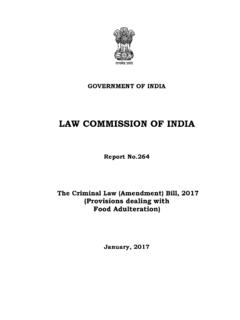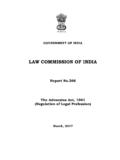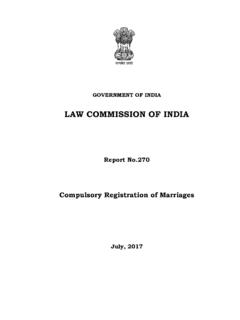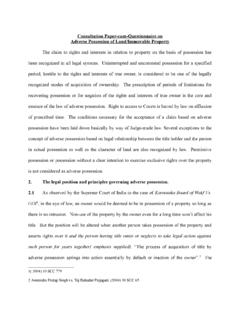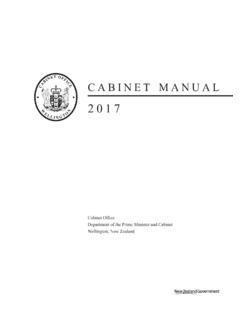Transcription of Electoral Reforms - Law Commission of India
1 GOVERNMENT OF India LAW Commission OF India Report Electoral Reforms March 2015 ii (3)/240/2013-LC(LS) 12 March, 2015 Dear Shri Sadananda Gowda ji, The Ministry of Law and Justice, in January 2013, requested the Twentieth Law Commission of India to consider the issue of Electoral Reforms in its entirety and suggest comprehensive measures for changes in the law. While working on the subject, the Supreme Court of India , in the matter of Public Interest Foundation & Others V. Union of India & Anr - Writ Petition (Civil) No. 536 of 2011, directed the Law Commission of India to make its suggestions on two specific issues, viz., (i) curbing criminalization of politics and needed law Reforms ; and (ii) impact and consequences of candidates filing false affidavits and needed law Reforms to check such practice.
2 In the light of this judgment, the Commission worked specifically on these two areas and, after series of discussions, followed by a National Consultation held on 1st February 2014, submitted its 244th Report titled Electoral Disqualifications on 24th February 2014 to the Government of India . After the submission of Report , the Commission circulated another questionnaire to all registered national and State political parties seeking their views on ten points, the response received was not very encouraging, though. However, the Commission undertook an extensive study to suggest Electoral Reforms , held various rounds of discussions with the stakeholders and analysed in-depth the issues involved.
3 After detailed deliberations, the Commission has now come up with its recommendations which are put in the form its final Report, Report , titled Electoral Reforms , which is sent herewith for consideration by the Government. With warm regards, Yours sincerely, Sd/- [Ajit Prakash Shah] Shri Sadananda Gowda Hon ble Minister for Law and Justice Government of India Shastri Bhawan New Delhi 110 115 iii Report Electoral Reforms Table of Contents Chapter Title Page I BACKGROUND TO THE REPORT 1-4 A History of Electoral Reforms in India 1-2 B Consultation Paper Issued by the Law Commission 2-3 C The 244th Report of the Law Commission 3 D The Present Report 3-4 II ELECTION FINANCE reform 5-68 A The Current Law: A Summary Snapshot 5-6 B B.
4 Need for Election Finance reform 7-11 C C. Laws Regulating Election Expenditure, Contributions, and Disclosure 11-19 (i) Laws regulating election expenditure for candidates 11-12 (ii) Laws regulating election expenditure for political parties: Third party expenditure 12-14 (iii) Laws regulating disclosure of election expenditure for candidates and parties 14-16 (iv) Laws regulating contribution to political parties 16-17 (v) Laws regulating disclosure of political contribution by parties and companies 17-19 D Electoral Expenditure, Disclosure, and Contribution: A Comparative Analysis 19-35 (i) United Kingdom 19-22 (ii) Germany 22-25 (iii) United States of America 25-28 (iv) Australia 28-31 (v) Japan 32-34 (vi) Philippines 34-35 E Legal Lacunae and the Under-reporting of Election spending 35-59 (i) Understanding the reality of election financing today 35-37 (ii) Legal lacunae 37-39 (iii) Recommendations 39-53 F State Funding of Elections 53-59 (i) History of reform proposals 54-55 (ii) Comparative provisions governing public funding of elections 55-57 (iii) Recommendations 57-59 iv G Recommendations 59-68 (i) On Expenses and Contribution 59-60 (ii) On Disclosure 60-64 (iii) On Penalties 64-67 (iv)
5 On State Funding of Elections 68 III REGULATION OF POLITICAL PARTIES AND INNER PARTY DEMOCRACY 69-79 A History of reform Proposals 69-70 B Laws Regulating Internal Democracy 70-72 C Internal Democracy: A Comparative Perspective 72-76 Germany 72-74 Portugal 74-75 Spain 75-76 D Recommendations 76-79 IV FROM FIRST PAST THE POST TO PROPORTIONAL REPRESENTATION 80-88 A The Current System and Its Alternatives 80-81 B The Merits and Demerits of the FPTP System 81-84 (i) Simplicity 81 (ii) Stability 81 (iii) Representativeness 84 C Merits and Demerits of Proportional Representation 83-88 (i) Simplicity 83 (ii) Stability 83 (iii) Representativeness 84 D The List System in Germany 84-85 E Recommendations of Past Reports 85-87 (i) Report of the ECI on the fifth General Elections in India (1971-72) 85 (ii) Chief Election Commissioner Shakdher s proposal 86 (iii)
6 170th Report of the Law Commission 86-87 F Recommendations 87-88 V ANTI DEFECTION LAW IN India 89-98 A Introduction 89-91 B Exceptions to the Law on Defection 91-93 C Procedure under Paragraph 6 of the Tenth Schedule 93-98 (i) The role of the Speaker in deciding petitions under the Tenth Schedule 93-95 v (ii) History of reform proposals 95-97 D Recommendation 97-98 VI STRENGTHENING THE OFFICE OF THE ELECTION Commission OF India 99-108 A Constitutional Protection of all the Members of the ECI 99-101 B Appointment of the Election Commissioners and the CEC 101-105 (i) Appointment process 101-103 (ii) Comparative practices 103 (iii) Recommendations 103-105 C Permanent, Independent Secretariat of the ECI 105-108 VII PAID NEWS AND POLITICAL ADVERTISING 109-137 A A. Introduction 109-111 B B.
7 Paid News and Political Advertising: Defining The Phenomena 111-112 C C. Issues and Problems with Paid News and Political Advertising 112-116 D D. Legal Framework 116-123 (i) Restrictions on election expenses 116-118 (ii) Disclosure provisions 118-119 (iii) Pre-certification of political advertisements 119-120 (iv) Requirement of maintaining distinction between news and advertisement 120-121 (v) Media Certification and Monitoring Committee ( MCMC ) 121-122 (vi) Inclusion of notional expenditure of paid news into the election expenses 122-123 E Recommendations by Other Studies on Paid News 123-126 (i) Mandatory disclaimer and separation of editorial and management 123 (ii) Amendment to the RPA 124 (iii) Guidelines for determining paid news 124-126 F Constitutional Issues.
8 Article 19(1)(a) and Article 19(2) 126-128 G A Comparative Perspective 129-132 (i) The United Kingdom 129 (ii) Australia 129-130 (iii) Canada 130 (iv) ECHR standards on permissibility of such 130-131 vi restrictions (v) US standards on permissibility of restrictions 131-132 H Recommendations 132-137 (i) Definitions 132-134 (ii) Electoral offence 134-135 (iii) Corrupt practice 135-136 (iv) Disclosure for political advertisements 136-137 VIII OPINION POLLS 138-156 A Regulation of Opinion Polls in India A Background 138 (i) Development of opinion polls in India 138 (ii) 1998 opinion poll guidelines 138-139 (iii) Challenge to the guidelines of the ECI 139-140 (iv) Important developments in 2004 140-141 (v) Amendments to RPA, 1951 Insertion of Sections 126A and 126B 141-142 (vi) Opinion polls and self-regulatory standards 142-143 (vii) Current law and late Mr.
9 Goolam E. Vahanvati s view on opinion polls 143-144 B Issues with Current Regulations 144-147 (i) Effects on the purity of the Electoral process 144 (ii) Potential of opinion polls to influence voters 144-146 (iii) Independence of polling agencies 146 (iv) Issue of robustness in findings 146-147 C Regulation in Other Countries 147-149 (i) United Kingdom 147-148 (ii) Canada 148 (iii) France 149 (iv) Singapore 149 D Opinion Polls A Case for Regulation, and Not Outright Ban 149-151 E Approach to Amendments 151-152 F Recommendations 152-156 vii (i) Expand scope of Section 126 of the RPA, 1951 152-153 (ii) Add specific sections on disclosures related to opinion polls 153-156 IX COMPULSORY VOTING 157-169 A Compulsory Voting in India : History and Context 157-159 B Evaluating the Arguments For and Against Compulsory Voting 159-167 (i) Participation: Does compulsory voting increase voter turnouts and improve the quality of political engagement?
10 159-163 (ii) Equality: Does compulsory voting ensure the enfranchisement of the weaker classes? 163 (iii) Democracy: Does compulsory voting increase the representativeness of the government or is it constitutionally untenable? 163-165 (iv) Legitimacy: Does compulsory voting increase the legitimacy of elected governments? 165-166 (v) Other arguments for and against compulsory voting 166-167 C Compulsory Voting: A Comparative Perspective 167-169 D Recommendation 169 X ELECTION PETITIONS 170-189 A History 170 B Formalistic Nature of the Current Procedure of Filing a Petition 171-173 C Appeal Procedure 173-174 D Drawbacks in the Present System 174-179 E Comparative Practices 180-184 F Recommendations 184-189 XI NOTA AND THE RIGHT TO REJECT 190-194 A History and Context Leading up to the Supreme Court s Decision in the NOTA Case 190-192 B Comparative Practices 192-193 C Recommendations 193-194 XII RIGHT TO RECALL 195-200 viii A History and Context 195 B Analysing the Arguments For and Against RTR 195-198 C Comparative Practices 198-199 D Recommendations 200 XIII TOTALISER FOR COUNTING OF VOTES 201-202 XIV RESTRICTION ON GOVERNMENT SPONSORED ADVERTISEMENTS 203-205 XV RESTRICTION ON THE
